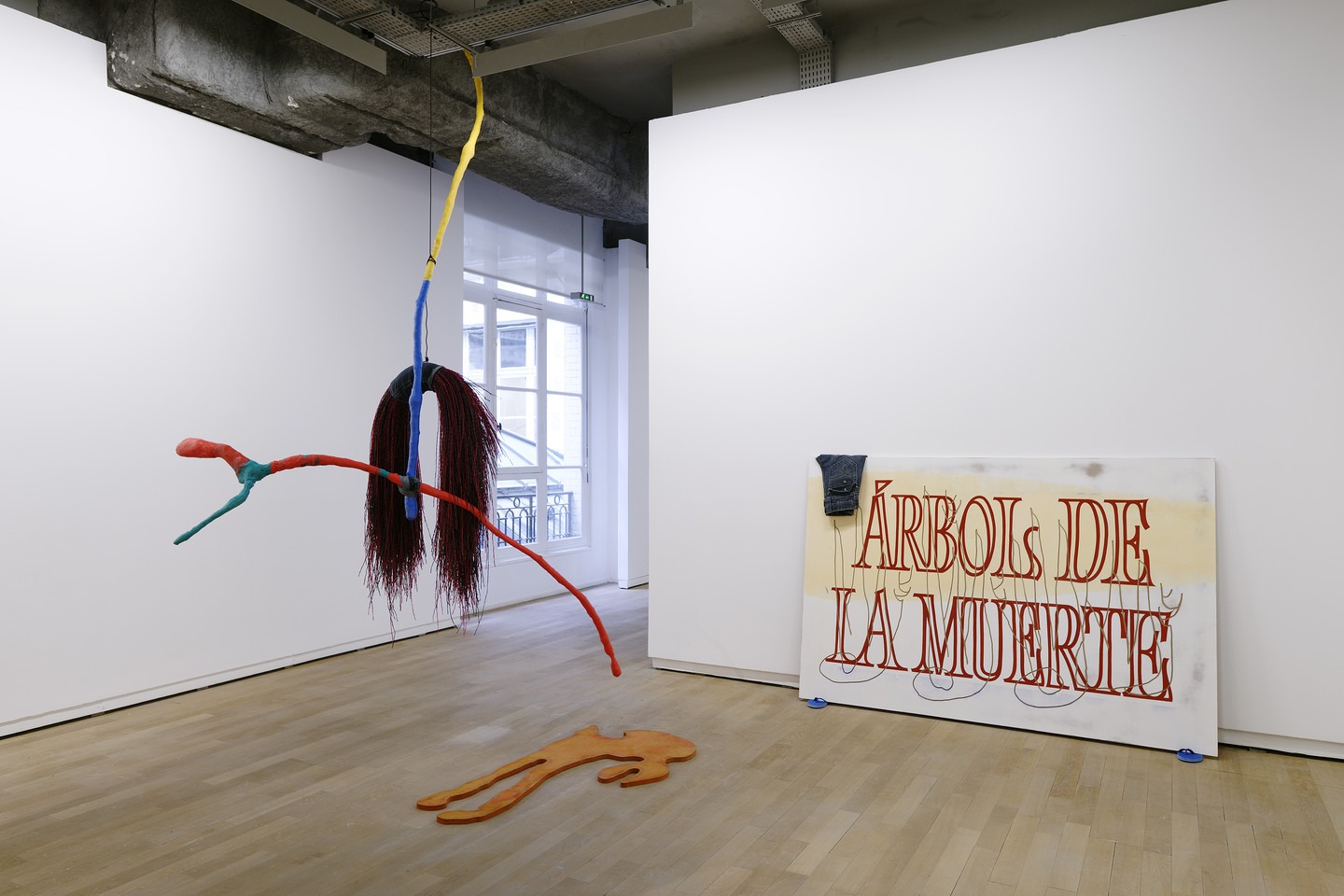Julien Creuzet
Toute la distance de la mer, pour que les filaments à huile des mancenilliers nous arrêtent les battements de cœur. - La pluie a rendu cela possible
23 Jan - 19 Feb 2018

Julien Creuzet - Toute la distance de la mer, pour que les filaments à huile des mancenilliers nous arrêtent les battements de cœur. - La pluie a rendu cela possible (...)
Photo: Aurélien Mole / Fondation d'entreprise Ricard
Photo: Aurélien Mole / Fondation d'entreprise Ricard
JULIEN CREUZET
Toute la distance de la mer, pour que les filaments à huile des mancenilliers nous arrêtent les battements de cœur. - La pluie a rendu cela possible
23 January – 19 February 2018
Curated by Mélanie Bouteloup, director of Bétonsalon
Fondation d'entreprise Ricard and Bétonsalon - Center for Art and Research are happy to present jointly a double solo exhibition by Julien Creuzet (b. 1986, Le Blanc-Mesnil, France).
In this project, Julien Creuzet comments on and finds shapes for stories of displacement, exile, acculturation and reappropriation of identities. His works combine everyday elements and wooden forms with poetry, songs and music. They inhabit the spaces of the two institutions and interact with one another: in one location the artist transforms standardized white furniture into inhabited radiant forests, while in the other, suspended wooden forms seem to hold their breath, torn between different organic forces, synthetic or financial. Creuzet places the link between identities and economies at the heart of his installations. He looks at the transatlantic trajectories of the Caribbean diaspora or of the migrants of the global South, subjects of a racial division of labor that remains hidden and is yet reflected in all spheres of our life, whether private or public.
By composing multilinear landscapes made up of heterogeneous elements, enlacing hurricanes of the Caribbean, the covered markets of Montreuil and Portuguese man o’ war, Creuzet echoes the concerns of the philosopher Achille Mbembe who in his essay Politiques de l’inimitié (La Découverte, 2016) asks: "How can we, in our divided world, contribute to the emergence of a thought that is capable of contributing to the consolidation of a democratic politics on a global level, a thought of complementarities rather than difference?" By thinking about the emotions and particular experiences of the world, he creates a space that is – both socially and formally – inhabited and where margins and centers are challenged.
Toute la distance de la mer, pour que les filaments à huile des mancenilliers nous arrêtent les battements de cœur. - La pluie a rendu cela possible
23 January – 19 February 2018
Curated by Mélanie Bouteloup, director of Bétonsalon
Fondation d'entreprise Ricard and Bétonsalon - Center for Art and Research are happy to present jointly a double solo exhibition by Julien Creuzet (b. 1986, Le Blanc-Mesnil, France).
In this project, Julien Creuzet comments on and finds shapes for stories of displacement, exile, acculturation and reappropriation of identities. His works combine everyday elements and wooden forms with poetry, songs and music. They inhabit the spaces of the two institutions and interact with one another: in one location the artist transforms standardized white furniture into inhabited radiant forests, while in the other, suspended wooden forms seem to hold their breath, torn between different organic forces, synthetic or financial. Creuzet places the link between identities and economies at the heart of his installations. He looks at the transatlantic trajectories of the Caribbean diaspora or of the migrants of the global South, subjects of a racial division of labor that remains hidden and is yet reflected in all spheres of our life, whether private or public.
By composing multilinear landscapes made up of heterogeneous elements, enlacing hurricanes of the Caribbean, the covered markets of Montreuil and Portuguese man o’ war, Creuzet echoes the concerns of the philosopher Achille Mbembe who in his essay Politiques de l’inimitié (La Découverte, 2016) asks: "How can we, in our divided world, contribute to the emergence of a thought that is capable of contributing to the consolidation of a democratic politics on a global level, a thought of complementarities rather than difference?" By thinking about the emotions and particular experiences of the world, he creates a space that is – both socially and formally – inhabited and where margins and centers are challenged.
